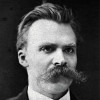“ who like every artist first attains the supreme pinnacle of his greatness when he can look down into himself and his art, when he can laugh at himself. ”
Friedrich Nietzsche, On the Genealogy of Morality (1887). copy citation
| Author | Friedrich Nietzsche |
|---|---|
| Source | On the Genealogy of Morality |
| Topic | greatness art |
| Date | 1887 |
| Language | English |
| Reference | |
| Note | Translated by Horace B. Samuel |
| Weblink | https://en.wikisource.org/wiki/The_Genealogy_of_Morals |
Context
“One might be tempted to suppose the contrary, even to wish it—that the Wagnerian Parsifal was meant joyously, like a concluding play of a trilogy or satyric drama, in which Wagner the tragedian wished to take farewell of us, of himself, above all of tragedy, and to do so in a manner that should be quite fitting and worthy, that is, with an excess of the most extreme and flippant parody of the tragic itself, of the ghastly earthly seriousness and earthly woe of old—a parody of that most crude phase in the unnaturalness of the ascetic ideal, that had at length been overcome. That, as I have said, would have been quite worthy of a great tragedian; who like every artist first attains the supreme pinnacle of his greatness when he can look down into himself and his art, when he can laugh at himself. Is Wagner's Parsifal his secret laugh of superiority over himself, the triumph of that supreme artistic freedom and artistic transcendency which he has at length attained. We might, I repeat, wish it were so, for what can Parsifal, taken seriously, amount to?”
source


